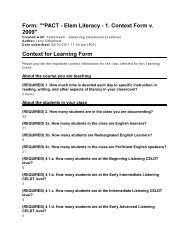The Tutoring Book - California State University, Sacramento
The Tutoring Book - California State University, Sacramento
The Tutoring Book - California State University, Sacramento
Create successful ePaper yourself
Turn your PDF publications into a flip-book with our unique Google optimized e-Paper software.
and that even the sessions that did not seem so stellar had taught some important things to the<br />
student and myself. When I realized all this, I was able to finally relax and actually enjoy<br />
tutoring! So, even though you will not believe this until you realize it for yourself, try to relax!”<br />
(Faye).<br />
• “Don't take the sessions too personally. It's easy to take on responsibility for the student writer,<br />
but this often results in distracting the tutor and hinders the session overall. Tutors can't take<br />
blame for the student's effort, received grades, or overall quality of their writing” (Kronzer).<br />
Tutor Expectations<br />
What is the one piece of advice you would like to pass on to a new tutor in next semester's class?<br />
• “<strong>The</strong> one piece of advice I would give a new tutor is to not set too high of expectations for<br />
themselves and/or the tutee when starting a new session. <strong>Tutoring</strong> is a process, both the tutor and<br />
tutee are learning through practice. And remember to make learning fun” (Colombo).<br />
• “Flexibility. As tutors, we need to think on our feet because different students require so many<br />
different techniques. Even though we read the theory and think we know all there is to know<br />
about teaching ESL students, or being minimalist tutors, or how to get passive students to become<br />
more active, we constantly meet students who shatter our preparation and expectations. But that’s<br />
okay, since it means we do not become machines, and that tutoring will never become a boring<br />
auto-pilot activity! Being able to flex one’s techniques, comfort zone, and habits in different<br />
situations is the proof of an outstanding tutor” (Faye).<br />
Resources/Materials<br />
What is the one piece of advice you would like to pass on to a new tutor in next semester's class?<br />
• “Read the book... it will help you in many ways” (Ross).<br />
• “Sometimes the way you actually tutor may differ from the way our textbooks tell us to teach,<br />
(but) that doesn’t mean your way is wrong. It’s okay to alter the textbook’s technique if your<br />
session neds it” (Tabrizi).<br />
• “Check out that little whirly-gig thing with the handouts in it! <strong>The</strong>re might be something in<br />
one of those handouts that can really help your tutees! Also, there's a stack of binders in the<br />
lounge that have some great resources in there. But I like the handouts in the whirly-gig<br />
because the tutee can take them with him/her” (Uttinger).<br />
What is one thing you wish you had been told when you started tutoring?<br />
• “It would be incredibly useful if you had a folder with a handout for how to use MLA, APA, and<br />
other citation methods” (Bains).<br />
• “I would have liked to have covered the ESL and students with learning disabilities sections (in<br />
our readings) at the beginning of the semester for the majority of the tutees I've been working<br />
with fall within those categories” (Colombo).<br />
• “Well, I was told, I think. But I forgot--make use of the WC handouts in that little twirly-gig<br />
thing. I wish I would have checked some of these out before some of my tutoring sessions. <strong>The</strong>y<br />
really are helpful!” (Uttinger).<br />
9

















